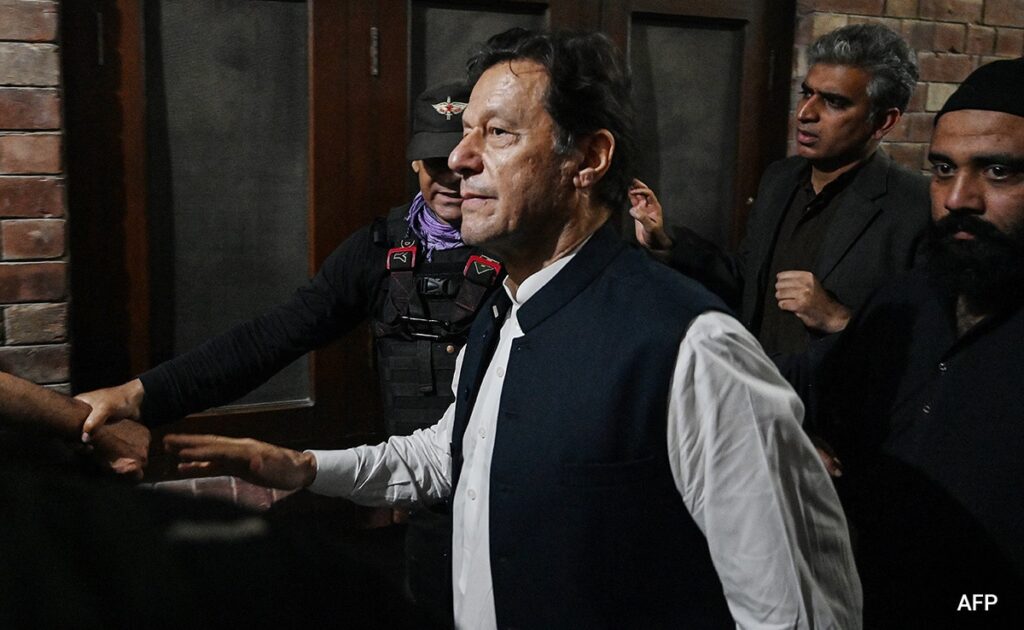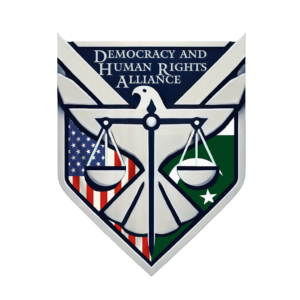A Non-Profit Organization
Democracy And Human Rights Alliance
Latest Updates
Introduction:
At Democracy And Human Rights Alliance, we are a non-profit organization dedicated to safeguarding democracy and human rights in Pakistan. In a time when democratic principles are under siege and serious human rights violations are escalating, we stand committed to making a difference. Our mission is to build a Pakistan where every citizen enjoys equal rights and opportunities under a transparent, accountable, and just democratic system. We strive to empower individuals, amplify marginalized voices, and foster a society grounded in the rule of law and respect for human dignity.

Human Rights Abuses in Pakistan
A Democracy Under Siege
Despite our mission for equality and justice, escalating human rights violations are threatening Pakistan's democratic foundations.
Unveiling the Shadows
The Alarming Rise of Police Brutality in Pakistan
Police brutality is a pervasive human rights concern in Pakistan, undermining public trust and the rule of law. According to the Human Rights Commission of Pakistan (HRCP), there were over 4,000 reported cases of police misconduct in 2022 alone, including instances of excessive force, torture, and unlawful killings. Amnesty International has documented that at least 1,800 individuals were subjected to torture or other ill-treatment by law enforcement agencies between 2021 and 2023.
The issue gained significant attention when, in May 2023, over 10,000 protesters were arrested during nationwide demonstrations. Many detainees reported physical abuse and were denied access to legal representation or bail. Reports suggest that a large number of these arrests were based on fabricated charges, further eroding confidence in law enforcement.
A study by Transparency International revealed that over 70% of Pakistanis perceive the police as corrupt or untrustworthy. This sentiment is compounded by the fact that less than 5% of complaints against police officers result in disciplinary action, fostering a culture of impunity. Trials related to police abuse are often conducted secretly, without public or media oversight, raising serious concerns about transparency and justice.
The lack of accountability and transparency within the police system hinders efforts to address the root causes of brutality. Comprehensive reforms are urgently needed to restore public trust. These include establishing independent oversight bodies, enforcing strict accountability measures, and ensuring transparency in legal proceedings. Addressing police brutality is essential for upholding the rights and dignity of all citizens and strengthening Pakistan's commitment to justice and the rule of law.
THE JOURNEY
A legend throughout the Years
The making of an icon: Imran Khan’s Cricket Era
Imran Khan’s journey from a cricket icon to a national leader is a testament to his unwavering spirit, leadership prowess, and unwavering commitment to excellence. His cricketing career, spanning over two decades, was marked by exceptional skill, tactical brilliance, and an indomitable spirit that inspired his teammates and captivated the nation.
Khan’s leadership qualities were evident from the early days of his cricketing career. His charismatic personality, ability to motivate and inspire, and strategic acumen made him a natural leader on the field. He captained Pakistan to numerous victories, including the historic 1992 Cricket World Cup, etching his name in cricketing history as one of the greatest all-rounders of all time.
From Cricket Legend to Philanthropic Pioneer
Following his illustrious cricketing career, Imran Khan embarked on a remarkable journey as a philanthropist, driven by a deep-seated compassion for the underprivileged and a desire to make a positive impact on society. His philanthropic endeavors have been instrumental in addressing critical healthcare needs, empowering underprivileged communities, and fostering hope for a better future. In 1994, Khan established the Shaukat Khanum Memorial Cancer Hospital, a non-profit institution dedicated to providing quality cancer care to all, regardless of their financial means. The hospital, named in memory of his mother who succumbed to cancer, has become a beacon of hope for countless cancer patients in Pakistan and beyond.
Khan’s philanthropic vision extended beyond healthcare, leading to the establishment of Namal College in 2008. Namal College provides vocational training and education to underprivileged youth, empowering them with skills and opportunities. Khan’s philanthropic endeavors have been recognized internationally, earning him the UNESCO
From Philanthropist to Political Visionary
Imran Khan’s transition from philanthropist to political leader was driven by a deep-seated disillusionment with the rampant corruption and misgovernance that plagued Pakistan’s political landscape. His frustration with the status quo and his unwavering belief in the potential for a better Pakistan fueled his decision to enter the political arena.
In 1996, Khan founded the Pakistan Tehreek-e-Insaf (PTI), a political party rooted in the principles of anti-corruption, social justice, and equitable development. The PTI’s message resonated with the masses, particularly the youth, who yearned for a change in the political landscape.Khan’s political journey was not without its challenges. He faced numerous obstacles, including threats, intimidation, and legal battles. Yet, he remained undeterred, his resolve strengthened by the unwavering support of his followers.
Through his political activism, Khan emerged as a powerful voice for change, challenging the corrupt practices and entrenched interests that had long held Pakistan back. His unwavering commitment to democratic principles and his refusal to succumb to corrupt practices further solidified his position as a formidable force in Pakistani politics.
From Political Visionary to Statesman
Imran Khan's journey from political activist to Prime Minister of Pakistan is a testament to his unwavering commitment to change, his ability to connect with the masses, and his unwavering belief in the potential of his nation. His rise to the pinnacle of Pakistani politics was marked by relentless determination, inspiring leadership, and a steadfast commitment to the principles of justice, transparency, and equitable development.
In the 2018 general election, the PTI emerged as the largest party, propelling Khan to the position of Prime Minister. His victory marked a watershed moment in Pakistani politics, signaling a shift away from the traditional political dynasties that had dominated the country for decades.
Khan's premiership was marked by a series of bold reforms aimed at addressing Pakistan's deep-rooted challenges and propelling it towards a brighter future. He initiated a nationwide anti-corruption campaign, introduced social welfare programs, and invested in infrastructure development. His efforts to strengthen Pakistan's economy, improve its international standing, and promote peace and stability in the region were met with both challenges and successes.
A Legacy of Transformation
Imran Khan's tenure as Prime Minister of Pakistan was marked by a resolute commitment to fulfilling the promises he made to the people. He initiated a series of bold reforms aimed at addressing the country's deep-rooted challenges and propelling it towards a brighter future.
Social Security
The PTI government created 5.5 million jobs in its first three years, the highest by any government on record.
Country Economic
$2 billion in value-added services exports in the first nine months of FY2022, demonstrating a 29% increase
Medical Service
Sehat Sahulat Program: 70 million Pakistanis covered under this free healthcare program
Women Rights
Women's Empowerment Initiatives: Kamyab Jawan Program provided loans to over 40,000 women entrepreneurs, and the Women Business Development Fund facilitated access to finance for over 10,000 women-led businesses
Foreign Policy
Improved Regional Relations: Trade volume with Saudi Arabia increased by 70%, with China by 30%, and with Turkey by 40%.
Focus on Education
50,000 new schools constructed across the country, providing access to education for over 5 million children
Do your part
Stand for a change
The future of Pakistan is in your hands. Register to vote and make your voice heard. Stand up against the injustice.
Unleash your voice, join the debate, and be a part of the movement.
D-Chowk: Where Voices Rise and Freedom Rings
Engage in vibrant discussions, share your perspectives, and join the conversation shaping Pakistan's future. D-Chowk is your platform to speak your mind and connect with fellow citizens.
